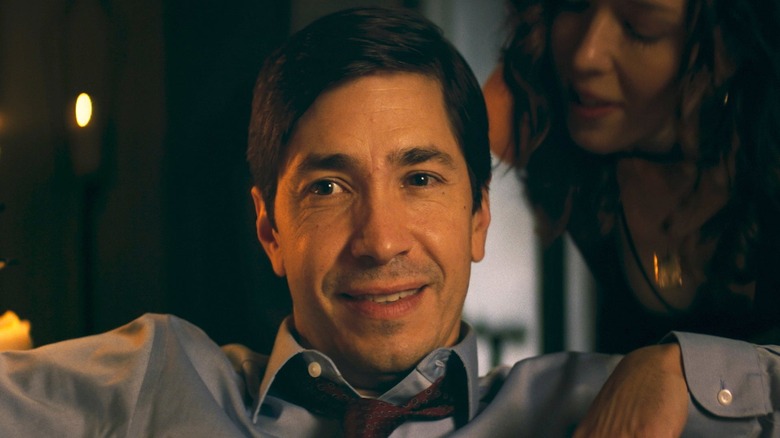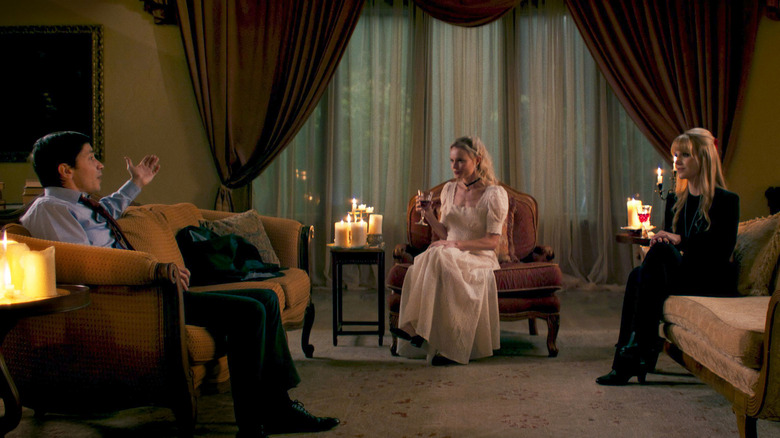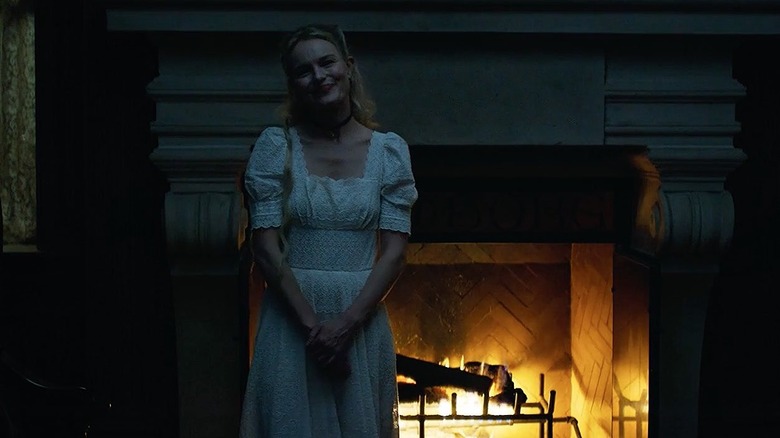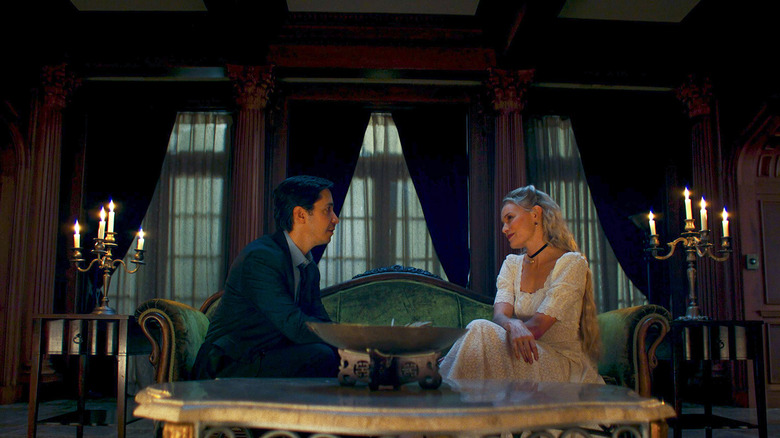House Of Darkness Director Neil LaBute Doesn't Mind Cheating Audiences [Exclusive Interview]
Neil LaBute is no stranger to horror. As he says, some audiences have called his infamous work from the '90s, including "In The Company of Men" and "Your Friends & Neighbors," basically horror movies. LaBute often portrays the worst in people and crafts uncomfortable experiences, making his instincts seem just right for the genre.
The playwright and filmmaker took his biggest leap into the genre realm with "The Wicker Man" remake. The not-so-great experience, which had a lot of cooks in the kitchen, didn't turn LaBute off from horror. For years, he worked on SyFy's "Van Helsing" and once even adapted "Dracula" for the stage. Now, LaBute is back with another horror yarn, "House of Darkness." It's a gothic mystery, which features actor Justin Long continuing his hot-streak of playing despicable characters.
Recently, LaBute talked to us about crafting his latest film and how his stories and audiences continue to evolve.
'Maybe Battleship is better than chess'
Whenever you venture into horror, people are surprised, but back in the '90s, it felt like you were making horror movies.
A couple people, I think, did call them horror movies. Yeah, of a certain type and you can only leave so many marks by talking to someone. I suppose when you slide over into horror, you're actually kind of free to leave actual marks. So you get a chance to kind of dig in a way that you don't when people are being just psychologically bad. This allows you some real black and white characters that can do really scary things. And it's just such a fun genre to work in and to try and get it right. I've had mixed success with it, but it's one that I definitely like it and am always drawn to.
You shot the movie in mostly one location. You've done that before, and obviously it's practical during a pandemic, but how do you use limited locations to reinforce themes and help tell the story best?
Well, certainly there's always that balance of creative and economic and obviously we were at a time when it made the most sense to do something very controlled with a small cast and small crew and fewer locations. And all those things made sense, but it wasn't like, "Oh, I want to do one of those COVID movies where it's about we're being locked in a room together because of this sickness out there." It was more about this is a perfect time to tell a story like this.
And so, all those things definitely played to our advantage in terms of making the movie, but finding a cool location, finding a way to kind of ratchet up the tension even when it's really just towards that with two people and then you add a third and fourth, it was a chance to do something that was very controlled.
I've done a couple things like that before. I did "Some Velvet Morning" a few years ago, and that was all in one house in Park Slope in Brooklyn and just two people. I like that kind of thing. I'm very drawn to chamber pieces like that. I wouldn't think someone would look at it and say, "Oh, that's quite a surprise." That way, I think partially more about the genre and where it goes, but it was a great recipe for making a movie in that situation.
Although, nights are never the easiest thing and we fought weather and all things that you wouldn't think you would in a film like this, but it's amazing what could happen in a two week period. So it had its own difficulties, but it was a blast to put it together.
For you, what's the best way to make a single location cinematic?
Well, so much is about layout and how you're going to use a place. And it's almost when you're rehearsing or if you have the time to rehearse, you really want to plot out how... It's almost like a play at that point, where you're like, "How many pages are going to happen here? What's going to naturally take them over to the next room or what moves them outside? Why don't they go outside?" It was feeling out this location and what was best about it.
Again, there was a lot of rain at that time. We were dealing with, can we go outside? Should we stay inside? Should we gamble on trying to shoot tonight outside or should we move that down the schedule? And when you have a short schedule, there's only so many moves that you get to make like that before you run out of room.
So it's a little bit like playing chess... Or maybe Battleship is better than chess. With chess, you can see all the pieces on the board. In Battleship, somebody's got to get that other side of the screen where you don't know exactly what's going on.
The element of surprise.
Yeah. So there's a little bit of that going on, but when you've got a game, cast and crew, you feel good about your chances and people are on their lines and do their jobs and COVID makes it tough, but it's obviously not impossible. And so we got a chance to put something fun together during that time.
'Yeah. Okay. He was an a******'
You're very aware of what expectations we have from horror movies. You toy with expectations. Any horror conventions you especially wanted to twist and turn?
Well, you're always thinking about, when you're dealing with the dark, what can you see and what can't be seen, how you use your sound design, jump scares, music. I had a new composer I hadn't worked with before. And so, how much music are we going to use? I'm someone who's generally pretty sparing in terms of their score or uses only what feels necessary and not to compensate for something that isn't there. So that was a big part of it of how much of the music we would use.
I think all those kinds of things are those elements that go into horror that I thought a good deal about. That dream sequence, how to make that effective, sometimes when you come out of something that ends up being a dream. An audience while they go with you, initially, they can feel like, oh, that was a cheat. So I want to make that as satisfying as I could make it. Those were kind of the elements that I had to worry about most in those terms.
Is it okay for you to cheat the audience? Do you think that can be good storytelling too?
I do. I don't think an audience minds being blindsided a little bit or cheated or tricked or feeling they're in the same place that the main character is. It's just a matter of balance and how well you do it. You appreciate it. The fun thing about a mystery often is that this is essentially... I mean, there are these mysterious qualities to it, but the fun of a flat out Agatha Christie, what's so good about it and why so many are written and people are drawn to them is, I think that they're kind of a win-win situation. Like an audience, if they don't figure it out, they're happy. If they do figure it out, they're happy.
So it's a different kind of happiness, but it's just satisfying to say, "Oh, you got me. I should have seen that as it is to actually get it right." Sometimes even more so. It's like, "Oh god, I should've thought of that." It's a fun reaction they have.
Here, it's kind of like, you should have, like Hap himself, you should have seen it coming. I think you do know something's coming, but it's like, do you know that's coming? And so, that's part of the fun part of the ride. If you do, you do. And if you don't, you go, "Oh s***. Didn't see that."
You've long tested the audience's threshold. I know it's a broad question, but what have you found audiences will and will not accept?
Well, sometimes those things change. They're definitely, I think, changing or influx these days. Behaviors, even words, all kinds of things. So, one has to be... I don't want to say careful because I think it's difficult to create and have to be careful. I think you have to just kind of go with your gut and say, "I think this is going to work," and then see how it goes. It's been a pretty fair barometer for me for 25 years or so. You kind of think that's probably what you're going to have to continue to do until it doesn't work anymore. And right now I felt like, "Yeah, I can still make a character like that." And you got to get to the point where the only question is, are you happy to see what happens to him or do you still go, "Yeah. Okay. He was an a******. Nobody deserves that"? So that's probably the big question on the way home, but as long as you leave people with a question, I think that's probably a good place to have left.
However you feel about that question, I think everyone can agree the practical effects at the end are great.
It is fun to watch good practical effects. I thoroughly enjoyed myself in the moment while we were doing it because CGI is one thing, but there's nothing quite like a good old fashioned, mid-'80s blood splatter.
'You certainly want to have at least some kind of finger on the pulse'
By the way, it's refreshing to hear your take on the changes happening today in storytelling, and not railing against it like some filmmakers do. Instead, it seems like you're listening.
Yeah. I think you have to look back at your stuff in the context of when it was created and it's fun to play a parlor game of, could you get that made today? It's in the past and it's, for two thirds of what I've done, probably not, but that's going to be the same for somebody now as 20 years from now.
I'd rather spend more time creating than worrying, but yeah, you certainly want to have at least some kind of finger on the pulse of what things are being said and going on. But again, you have to kind of be true to whatever your story is, at least.
You kind of have to see that thing through. I think people are ultimately in general more pleased to see someone stick to their guns and do something, whether they love it or not rather than they can really smell when you're just trying to cater to fashion. And that's certainly not the road for me. I can only kind of go off of instinct and do my best.
At the same time, you don't want to soften the edges of horrible people, right?
Oh, sure. I mean, and of course, these people are fiction. There's actually folks out there who would put these guys to shame and really exist. And with real consequences. I mean, this is where we should just have fun because every time you walk out of a theater, no matter how tense it's been or funny or whatever, it's like, "Oh yeah, that never really happened." No one was hurt in the making of this. No animals were tripped. No people's feelings were really crushed. Everybody went home at the end of the day. So you should be able to kind of have the most fun and be the most outrageous in spaces like the cinema or the theater.
And yet these days it feels like people are really leaned where, "Oh, I really want this to be a safe space. I want it to be only nice fun things are being said." It's not a misuse of the space, but a limited use of the space. It should be whatever we can conjure and put out there and have a catharsis through and then go back to our own situations. That's the place to do it.
Also, like what you like, and don't like what you don't like, right?
Very true.
"House of Darkness" is now playing in limited release and available on VOD.



